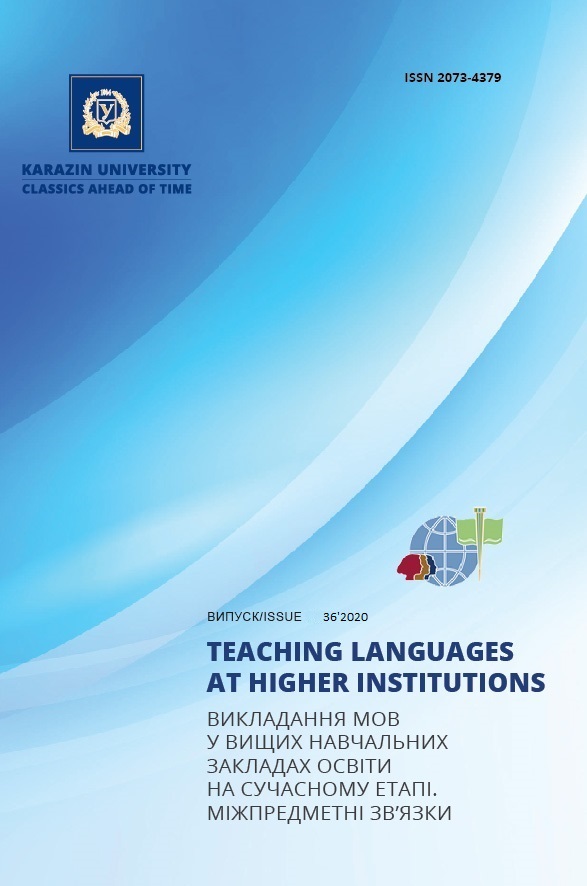Using language and culture material in ukrainian folklore classes
Abstract
The methodical techniques and the methods of using language and culture material when teaching Ukrainian folklore are determined in the article. Ukrainian proverbs, sayings, songs, which reflect the vision of the Ukrainian people of female beauty, are language and culture material in this instance. The topicality of the research is caused by the extensive use of folkloric material in all modern languages with a didactic purpose and necessity of research in the ethnolinguoculturological aspect of language units that designate national and cultural stereotypes. The folklore of any nation belongs to the eternal phenomena; it is impossible to imagine the existence of a nation without it. National culture and specific features of mentality become known through folklore. Folklore helps to recreate the traits of any particular people, the development of ideas about different things. The use of proverbs in speech is an important indicator of language proficiency level. Working with proverbs and sayings helps to develop skills of speech activity. The studying of proverbs and sayings expands the students’ knowledge about language, form their aesthetic taste, desire to perfect their vocabulary. It improves speech culture, speaking skills, readiness for debating in Ukrainian. The increased use of proverbs enriches the spoken and written language. The use of proverbs adds originality, expressiveness, individuality, imagery and aphoristic nature to a person’s speech. Learning proverbs or sayings, students translate them into their language, comprehend and search for similar ones in their language. Discussing and comparing Ukrainian proverbs and sayings with proverbs and sayings in their native language, students develop skills in speaking, reading, and writing. Perspectives of further research are studies of the features of teaching language and culture material to foreign philological students and further development of new teaching material for the course “Ukrainian folklore”.
Downloads
References
Galka, Yu.M. (2000). Vykladannya ukrayinskoyi movy yak inozemnoyi u lingvokrayinoznavchomu aspekti [Teaching Ukrainian as a foreign language in the aspect of culture-oriented linguistics.]. Available at: http://kmp.fl .kpi.ua/uk/node/45 [Accessed 16 March 2020] [in Ukrainian].
Kiseleva, S.N. (1984). K voprosu ob ispolzovanii edinic frazeologii i aforistiki v uchebnom processe na podgotovitelnom fakultete [On the use of units of phraseology and aphoristics in the teaching process at the preparatory faculty]. Russkiy yazyik dlya studentov inostrentsev [Russian for foreign students]. Moscow: Russkij jazyk, 23, pp. 71−78 [in Russian].
Moroz, L. (2014). Vyvchennya lingvokrayinoznavchogo aspektu v procesi ovolodinnya inozemnymy movamy [Study of the aspect of culture-oriented linguistics in the process of mastering foreign languages]. Nova pedagogichna dumka [New pedagogical thought], 2. Available at: http://nbuv.gov.ua/UJRN/Npd_2014_2_40 [Accessed 15 March 2020] [in Ukrainian].
Panasenko, T.M. (2004). Ukrainski pryslivia i prykazky [Ukrainian proverbs and sayings]. Kharkiv: Folio [in Ukrainian].
Polyakova, S.V. (2006). Lingvokrayinoznavstvo – osvita zasobamy inozemnoyi movy [Culture-oriented linguistics as education by means of a foreign language]. Available at: http://www.rusnauka.com/ESPR_2006/Philologia/ 10_poljakova%20s.v.doc.htm [Accessed 15 March 2020] [in Ukrainian].
Sheremeta, V.P. (2017). Natsionalno-kulturni stereotypy movoobrazu zhinky v ukrainskykh narodnykh pisniakh [National and cultural stereotypes of women’s language in Ukrainian folk songs]. Сandidate’s thesis. Kyiv: National Pedagogical Dragomanov University. Available at: https://npu.edu.ua/images/file/vidil_aspirant/avtoref/%D0%94_26.053.25/ Sheremeta.pdf [Accessed 16 March 2020] [in Ukrainian].
Suduk, I., Lytvyn, N. and Tytova, M. (2016). Shlyahy formuvannya lingvokrayinoznavchoyi kompetenciyi na zanyattyax z ukrayinskoyi movy yak inozemnoyi [Ways of formation of linguistic and country specific competence in classes of Ukrainian as a Foreign Language]. Visnyk ONU [ONU Bulletin], Philological Series, pp. 153−159 [in Ukrainian].
Valit, O.S., Gutnikova, T.Yu., Zadorozhnya, L.V. and Rudenko, G.G. (2020). Ukrayinskyj folklor dlya inozemnyx studentiv [Ukrainian folklore for foreign students]. Kharkiv: FLP Tarasenko V.P. [in Ukrainian].

